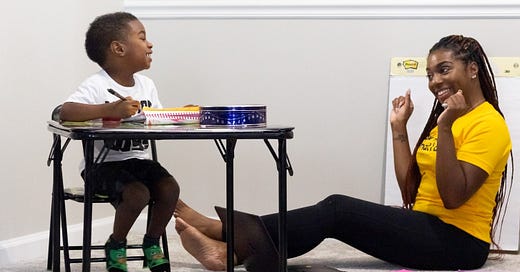Photo by Natasha Hall on Unsplash
To paraphrase Carl Sagan, there are billions and billions of ways to spend your time as an elder. Today I want to highlight one volunteer opportunity that hits the trifecta: personal gratification for the volunteer, engagement with the young, and long-term impact on society. That program is Experience Corps.
Experience Corps recruits, screens, and trains older adults to go into elementary schools and work one-on-one with children who need an assist to become strong, confident readers. It was piloted in the late 1990s and is now in 22 cities. The program once operated under AmeriCorps and has been managed by AARP Foundation since 2011.
It is also one of the most thoroughly researched programs extant. Social scientists, many of them affiliated with Johns Hopkins Medical Center, have published numerous studies about Experience Corps over the past 20 years. They confirm that students benefit, older volunteers benefit, and the positive advantages for elders outweigh the added stresses (one of which might well be the sensation of being under a magnifying glass). But the studies do confirm good results. In a recent report from Baltimore, where Experience Corps has operated since 1999, 92 percent of classroom teachers reported that volunteers had a strong or moderate influence on student reading and literacy performance, and 99 percent of tutors were satisfied with the academic progress of their students.
If it sounds like a gig suitable only for retired teachers, it’s not – although teaching experience certainly helps. “You bring whatever treasures you have from your experience,” says Natasha Ramberg, Branch Director of the Baltimore program. “That’s the ‘E’ in Experience Corps.” Volunteers qualify if they are 50 or older, hold a high school diploma or GED, and pass a criminal background check and a basic literacy screening. Every volunteer gets more than 20 hours of training before they are placed, with more ongoing while they serve. Volunteers commit to serving from 5 to 15 hours weekly through an entire school year.
All volunteers assigned to a school form a team, which may range in size from 4 to 20. Teams meet regularly to talk about common issues and share what has worked for them.
“We know that older adults who continue to engage in any way have better lives,” says Ramberg. “For many of our volunteers, their children are grown, and some have lost spouses. But now they get to work with folks who’ve had similar experiences. They have people to talk to. Tutoring children helps keep them moving forward mentally. It gets them excited, and it gives them purpose.”
“It’s a triple win,” she adds. “Students are successful, older adults thrive, and communities grow stronger.”
Interested? You can learn more about Experience Corps on their website, Experience Corps (aarp.org).
Your Take
A number of readers reacted to the article on memory’s negative bias – and in particular, how that biased recollection affected their own life narratives. Here is a sampling of the commentary:
“I can relate to the connection between poor memory and depression. Here’s another angle. When negative memories shout over good ones, we can tend to write a misleading narrative of our own lives. Later in life, I found the time and stability to re-evaluate the connections among the islands of events in my life’s stream and write a new, truer (I believe) narrative of my journey. Coincidentally or not, I now find in my fiction that I can write more cohesive narratives than I was able to create in my younger years.” – B.P.
“This is so true. As a lifelong sufferer of depression, my narrative of my childhood has always been filled with the negatives. I'd describe myself as insecure, needy, and overly sensitive. However, recently, while working on a memoir, I looked at my childhood photos--there I was, smiling, laughing, playful! Only an occasional frown or shy expression appeared. I am now seeing my past in a different light, one that's more forgiving and empathetic. I'm also less critical of my current self. Perception is reality, after all!” – J.O.
OK, let's check your theory and practice, Donaldo! I have really enjoyed your articles. I have read all of them. I liked them so much I print them. I look forward to receiving the next week's article. I like your sense of humor, and I totally get it. It reminds me of a friend I had growing up (he once was lost but now he's found). The founder of CBT is Aaron T. Beck, not Adam (he was the first so he could have been an Adam!). So which comment do you concentrate on? The spellcheck at the end or the six positives before it? Hmmmmm....” – R.N.
[Guilty as charged! Praise is nice, but how I hate making factual errors!]





Thanks, Jerry. I hope you'll find future articles helpful and thought-provoking.